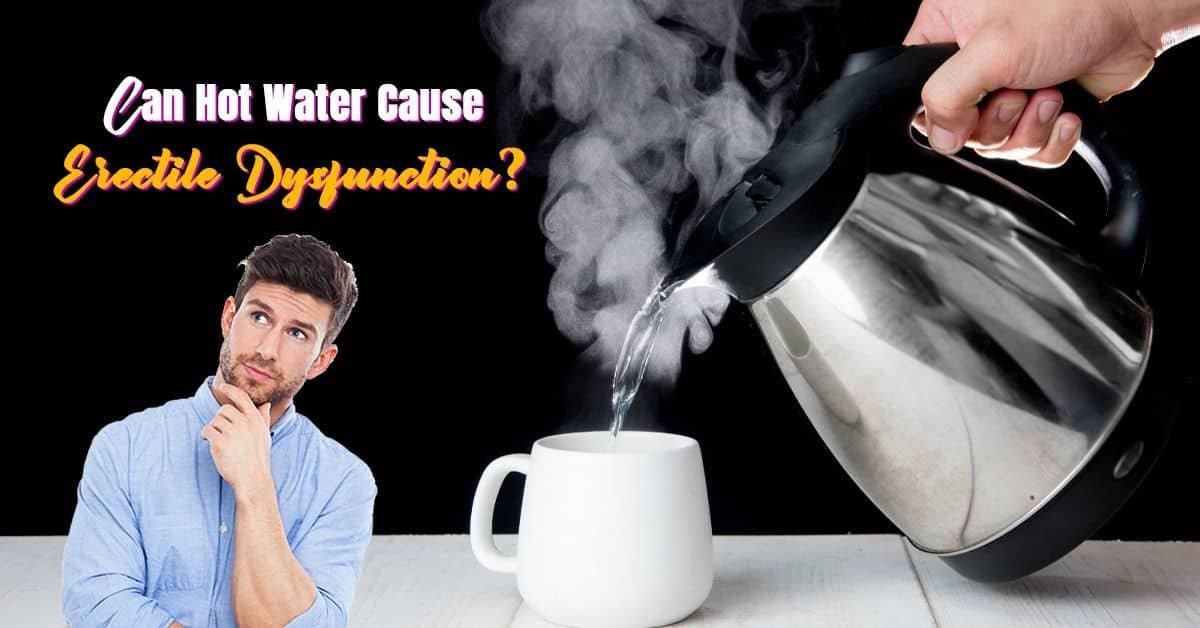No products in the cart.
Erectile Dysfunction
Can Hot Water Cause Erectile Dysfunction?
Ever wondered if a relaxing soak in a hot tub or a steamy shower might affect your erections? The concern about hot water causing erectile dysfunction is a common one among men.
This article explores the potential link between hot water exposure and erectile function. We’ll delve into the science behind erections and how hot water might indirectly influence this process. We’ll also discuss practical tips for managing any temporary concerns you might experience after enjoying a hot bath or sauna.
Table of Contents
Can Hot Water Cause Erectile Dysfunction?
Erectile dysfunction is a complex issue influenced by various factors. While hot water exposure isn’t a direct cause, it could indirectly contribute to the condition. Excessive heat, especially prolonged exposure from hot baths or saunas, can potentially affect blood flow.
Additionally, Our bodies prioritize core temperature regulation, so blood vessels near the skin dilate to release heat. This might temporarily divert blood away from other areas, including the penis, potentially impacting erectile function.
Some studies suggest that heat exposure may influence bodily functions like circulation and hormonal balance, which can play a role in sexual health. However, occasional hot water exposure is unlikely to cause significant issues. Chronic exposure or underlying health conditions could exacerbate the problem.
See also: Can cold water cause ed?
Indirect Effects of Hot Water on Erectile Function
While hot water exposure itself likely won’t cause lasting erectile dysfunction, there are some indirect ways it might temporarily impact your ability to achieve or maintain an erection. One way this can happen is through dehydration.
Dehydration and Blood Flow
Our bodies rely on proper hydration for many functions, including sexual health. When you spend time in a hot bath or sauna, you sweat more than usual to regulate your body temperature. This sweating can lead to dehydration, which means there’s less fluid circulating in your bloodstream. Reduced blood flow can affect the penis, making it difficult to get or keep an erection.
Testicular Temperature and Sperm Production
Some studies suggest that chronically elevated scrotal temperature from frequent use of hot tubs or tight-fitting clothing might be linked to decreased sperm production. However, it’s important to note that this research is ongoing and the link to ED is not well-established.
Can High Water Temperatures Affect Blood Flow?
Our bodies rely on a complex interplay between nerves, hormones, and blood flow to achieve an erection. During sexual arousal, signals travel through nerves, causing blood vessels in the penis to relax and widen. This increased blood flow inflates the spongy tissue within the penis, leading to an erection.
Hot water exposure, similar to how hot weather can affect blood flow, can cause blood vessels throughout the body to dilate, so we often feel flushed after a hot bath or a day spent outside in hot weather.
While this dilation can improve circulation in some areas, it’s important to understand that the body prioritizes maintaining core temperature. When exposed to hot water or hot weather, blood vessels near the skin’s surface dilate to increase heat release. This temporary shift in blood flow might theoretically reduce blood flow directed towards other areas, like the genitals.
Related: Can winter Causes erectile dysfunction?
Managing Erectile Concerns After Hot Water Exposure
While hot water exposure itself is unlikely to cause lasting erectile dysfunction, some men might experience temporary issues after enjoying a hot bath or sauna. Here are some practical tips that can help:
Rehydration Strategies
Sweating is the body’s natural way to cool down. However, excessive sweating during a hot bath or sauna can lead to dehydration. Dehydration can affect blood flow throughout the body, potentially impacting erectile function.
It’s important to stay hydrated before, during, and after hot water exposure. Aim to drink plenty of water throughout the day, and consider electrolyte-rich beverages after sweating to replenish lost minerals.
Cooling Techniques
After a hot bath or sauna, your scrotum may feel warm. This elevated scrotal temperature can temporarily affect sperm production (although not directly linked to ED). To cool down, try wearing loose-fitting clothing and consider applying a cold compress to your groin area for a short period.
Maintaining a Healthy Lifestyle
Overall good health plays a significant role in sexual function. Eating a balanced diet, exercising regularly, and managing stress levels can contribute to a healthy vascular system and improve blood flow throughout the body, including the genitals.
Conclusion
In conclusion, while there’s no clear evidence that hot water causes erectile dysfunction, it can contribute to temporary issues in some men. This can be due to dehydration from sweating during hot baths or saunas, which can affect blood flow throughout the body. Additionally, very hot water exposure may elevate scrotal temperature, potentially impacting sperm production (although this isn’t directly linked to ED).
Faqs
Can heat cause erectile dysfunction?
While direct links are unclear, overheating from hot weather might decrease testosterone, potentially impacting erections. Staying hydrated and well-rested can help.
Do hot baths help erectile dysfunction?
The theory exists that hot baths might improve circulation, potentially aiding erections. However, more research is needed for confirmation.
Does drinking water help you last longer in bed?
Dehydration can affect blood flow and overall health, potentially impacting sexual performance. Regular water intake is crucial for optimal sexual function.
Reference
https://www.medicalnewstoday.com/articles/321795
Disclaimer: This Article does not provide any medical advice. The information is intended for general knowledge and should not be interpreted as a substitute for professional medical consultation.


